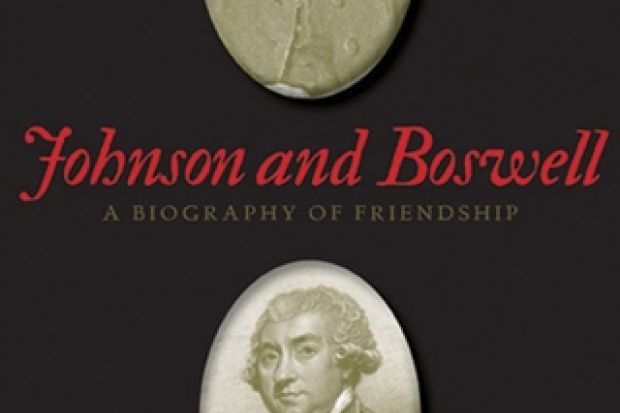In this big bustling book on one of history’s most famous literary couplings, James Boswell and Samuel Johnson - the original BoJo - John Radner tracks a creative partnership “that was much more volatile, contentious and troubled than their published writings indicate”, from the first meeting on 16 May 1763 to Johnson’s death in 1784 and Boswell’s Life in 1791. Boswell’s allusion to “this great Man and poor Me” and plaintive “Will you really take charge of me?” suggests one-sidedness, but Johnson’s early declaration - “My dear Boswell! I do love you very much” - supports Radner’s case against viewing Boswell as “essentially a parasite”.
The story of this mentor-mentee relationship, “an evolving, multifaceted collaboration”, is complex and Radner relishes its richness. Sometimes the detail is deafening. Radner sets the reader little exercises, proposing days in the archives comparing letters and journals, or suggesting 15 minutes pondering how we might sketch the lives of contemporaries.
In Radner’s account of Boswell’s motivation, “an insecure young man with a cold, judgemental father finds…a childless widower who zestfully ‘adopts’ him”. Johnson spotted Boswell’s neediness: “There must always be a Struggle between a Father and Son, while the one aims at power, and the other at Independency”. Father-son clichés aside, Boswell found in Johnson “a fellow depressive”. Their moods matched.
There are shades of Men Behaving Badly when the companions ‘competed for the attentions of women, both real and imagined’
Two key aspects of the relationship stand out: the extent to which Johnson’s biographical - and autobiographical - efforts in The Lives of the Poets offered an ethics of representation for Boswell, engaged in his biography of Johnson, and the significance of their different versions of the Scottish journey as revealed by Johnson’s letters and Boswell’s draft journal.
As Johnson laboured on his Lives of the Poets, creeping closer to contemporaries, he warned against being too exacting in telling tales of those with living friends and relatives: “rather to say nothing that is false, than all that is true”. His Life of Pope challenged the idea of letters as soul-baring missives, instead maintaining that “no transaction…offers stronger temptations to fallacy and sophistication than epistolary discourse”.
As Anglo-Scottish relations go, the Johnson-Boswell collaboration is compelling as father figure and junior partner jostle for their own sense of self. Starting in London, the friendship was sealed in Scotland during three months in the Highlands and Hebrides in the autumn of 1773. On this road trip, Johnson was friend and fiend, mentor and tormentor, taunting Boswell about drink and desire. We see the duo reciting Macbeth; sharing fears of being murdered in their sleep, each spooked by skeletons and ghosts; visiting Hawthornden at Johnson’s insistence to see where Ben Jonson and William Drummond conducted an earlier cross-border literary conversation.
There are shades of Men Behaving Badly when the companions “competed for the attentions of specific women, both real and imagined, and challenged…each other’s potency”, Boswell wrestling with images of his mentor refusing a backstage pass at Drury Lane, because, as Johnson told David Garrick, “the White bubbies and the silk stockings of your Actresses excite my Genitals”; Johnson threatening Boswell with castration, saying “he’d make a very good eunuch”; Boswell vomiting after drinking the punch Johnson warned him off. Every Johnson needs his Boswell, and vice versa.
With so much time together, they needed constructive time apart: “each friend occasionally sought to free himself from the enlivening, reassuring, but also confining and controlling presence of the other in order to escape his companion’s defining expectations”. Reading Radner, I envisaged Boswell and Johnson variously as Bialystock and Bloom, Hal and Falstaff, Morecambe and Wise, and The Odd Couple. As a biography of friendship, this book offers sound advice: keep your friends close, and your biographer closer.
Johnson and Boswell: A Biography of Friendship
By John B. Radner
Yale University Press, 415pp, £29.95
ISBN 9780300178753 and 189087 (e-book)
Published 29 March 2013
Register to continue
Why register?
- Registration is free and only takes a moment
- Once registered, you can read 3 articles a month
- Sign up for our newsletter
Subscribe
Or subscribe for unlimited access to:
- Unlimited access to news, views, insights & reviews
- Digital editions
- Digital access to THE’s university and college rankings analysis
Already registered or a current subscriber? Login




